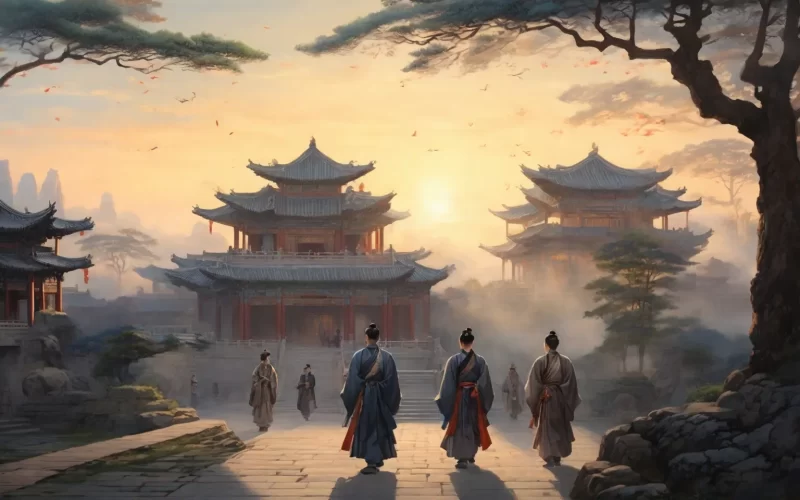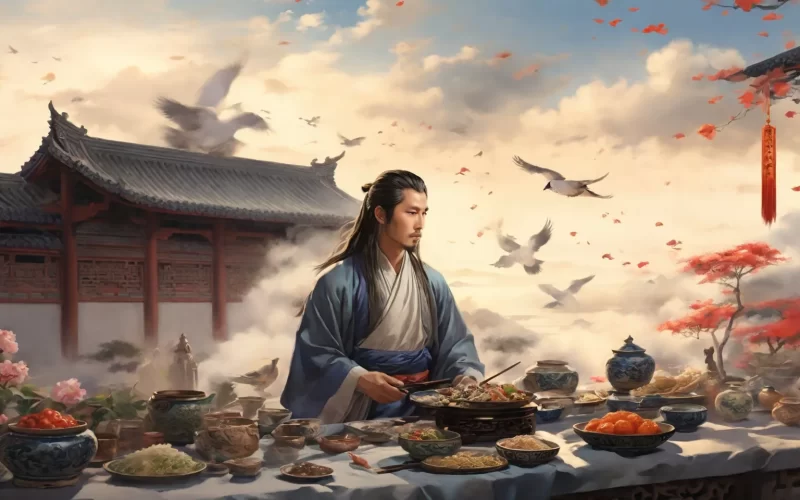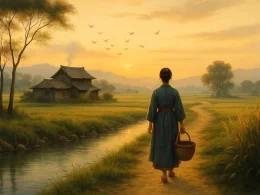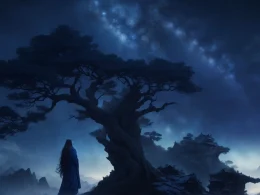The north wind rolls the white grasses and breaks them;
And the Eighth-month snow across the Tartar sky
Is like a spring gale, come up in the night,
Blowing open the petals of ten thousand peartrees.
It enters the pearl blinds, it wets the silk curtains;
A fur coat feels cold, a cotton mat flimsy;
Bows become rigid, can hardly be drawn
And the metal of armour congeals on the men;
The sand-sea deepens with fathomless ice,
And darkness masses its endless clouds;
But we drink to our guest bound home from camp,
And play him barbarian lutes, guitars, harps;
Till at dusk, when the drifts are crushing our tents
And our frozen red flags cannot flutter in the wind,
We watch him through Wheel-Tower Gate going eastward.
Into the snow-mounds of Heaven-Peak Road....
And then he disappears at the turn of the pass,
Leaving behind him only hoof-prints.
Original Poem:
「白雪歌送武判官归京」
岑参
北风卷地白草折, 胡天八月即飞雪;
忽如一夜春风来, 千树万树梨花开。
散入珠帘湿罗幕, 狐裘不暖锦衾薄。
将军角弓不得控, 都护铁衣冷犹著。
瀚海阑干百丈冰, 愁云黪淡万里凝。
中军置酒饮归客, 胡琴琵琶与羌笛。
纷纷暮雪下辕门, 风掣红旗冻不翻。
轮台东门送君去, 去时雪满天山路;
山回路转不见君, 雪上空留马行处。
Interpretation:
A song of white snow in farewell to Field-clerk Wu going home is a farewell frontier poem written by Cen Shen, a poet of the Tang Dynasty. Wu Panguan was a former colleague of Cen Shen, and this poem was composed when Cen Shen bid farewell to Wu, who was returning to the capital to report on his duties. At the time, Cen Shen was serving in the northwest frontier, in the military headquarters of the Beiting Jiedushi (Frontier Command). Surrounded by a world of ice and snow, the poet’s emotions intertwined with the grandeur of the frontier scenery and the sorrow of parting with a close colleague. Through his magnificent depiction of the snowy frontier landscape and imaginative verses, Cen Shen seamlessly blends the themes of snow, scenery, emotion, and farewell, creating a highly distinctive and renowned frontier farewell poem.
First Couplet: “北风卷地白草折,胡天八月即飞雪。”
The northern wind sweeps across the land, bending even the white grasses; in the lands of the Hu people, snow already falls in the eighth month.
These lines open with a powerful visual impact, presenting the harsh and peculiar climate of the northwest frontier, where snow falls as early as the eighth month. They set a distinctive environmental tone for the entire poem, emphasizing the extreme conditions of the borderlands.
Second Couplet: “忽如一夜春风来,千树万树梨花开。”
Suddenly, as if spring’s breeze arrived overnight, thousands upon thousands of trees bloom with pear blossoms.
This famous metaphor compares the snow-covered landscape to trees bursting into pear blossoms in spring. The imagery is fantastical and romantic, yet tinged with the coldness of snow, showcasing Cen Shen’s imaginative brilliance. This couplet has been passed down through the ages.
Third Couplet: “散入珠帘湿罗幕,狐裘不暖锦衾薄。”
Snowflakes drift through the pearl curtains, dampening the silk canopy; even the fox-fur coat provides no warmth, and the brocade quilt feels thin and cold.
The scene shifts from the outdoors to the interior, showing that the bone-chilling cold penetrates everywhere. These vivid details highlight the hardships of life on the frontier and set the emotional tone for the farewell to come.
Fourth Couplet: “将军角弓不得控,都护铁衣冷犹著。”
The general’s hands are so frozen that he cannot draw his war bow; the Commander-in-Chief still wears his cold iron armor.
These lines focus on the physical experience of the soldiers, portraying both the extreme cold and the indomitable spirit of the frontier troops who remain steadfast despite the bitter weather.
Fifth Couplet: “瀚海阑干百丈冰,愁云黪淡万里凝。”
Vast deserts crisscrossed with towering sheets of ice, while gloomy clouds stretch endlessly, heavy with sorrow.
This exaggerated panoramic view of the frozen frontier merges the chilling scenery with the poet’s melancholy over the impending farewell, adding weight to the emotional atmosphere.
Sixth Couplet: “中军置酒饮归客,胡琴琵琶与羌笛。”
In the central military tent, a farewell feast is laid for the departing guest, with Huqin, pipa, and Qiang flute playing together.
The farewell scene unfolds here, with exotic music creating a unique borderland ambiance. The festive atmosphere contrasts with the underlying sorrow of parting.
Seventh Couplet: “纷纷暮雪下辕门,风掣红旗冻不翻。”
At dusk, snow falls heavily outside the camp gate; the fierce wind tugs at the red flag, frozen stiff and unable to flutter.
The snowy frontier scene enhances the grandeur and severity of the setting, while also adding a touch of desolation to the farewell.
Eighth Couplet: “轮台东门送君去,去时雪满天山路;山回路转不见君,雪上空留马行处。”
At the eastern gate of Luntai, I see you off; snow covers the ancient road through the Tianshan Mountains. As the winding road twists, you disappear from view, leaving only your horse’s tracks in the snow.
The poem ends with this evocative snowy farewell scene. The distant, snow-covered road and the fading hoofprints capture both the visual and emotional essence of parting, leaving a lasting impression of solitude and longing.
This poem gradually unfolds the farewell scene and emotional undercurrents through the depiction of the magnificent, freezing landscape of the frontier. It seamlessly blends the grandeur of the borderlands with the delicate sorrow of parting, creating a harmonious fusion of visual splendor and heartfelt emotion. The poem’s unique style balances imaginative fantasy with genuine sentiment, blending vivid imagery with deep emotional resonance.
Overall Appreciation:
This poem centers on the theme of farewell, using the extreme snowy landscape and vast frontier scenery to vividly convey the harshness of the northwest border region, the hardships endured by frontier soldiers, and the complex emotions of saying goodbye to a dear friend. The resulting composition is rich with visual and emotional impact.
Snow serves as the central motif, linking the poem’s imagery, emotion, and character portrayal seamlessly. From the snow-laden “pear blossom world,” to snow drifting into the tent, to border generals standing guard in the cold, the relentless chill pervades the setting. Yet within this icy realm, soldiers remain steadfast, embodying the spirit of unwavering loyalty. During the farewell banquet, the exotic melodies of Huqin, pipa, and Qiang flute highlight the distinctive frontier atmosphere while subtly underscoring the sorrow of parting. The poem ends with the poignant image of snow-covered paths gradually obscuring the departing friend, leaving only fading hoofprints — a masterful visual metaphor for the poet’s lingering grief and longing.
The poem’s imagination is bold and fantastical, its imagery vast and majestic. The structure unfolds naturally, with layers of scenery and emotion progressing from outer landscape to inner sentiment. Its seamless fusion of scenery and emotion creates both a stunning visual experience and a deeply moving emotional journey. This poem is not only a magnificent panorama of the snowy frontier but also a masterpiece among farewell poems. It captures both the grandeur and hardships of the frontier and reflects the bold and open-hearted spirit of Tang poets, alongside their tender attachment to friends.
Writing Features:
- Imaginative and Vivid Imagery
The poet uses the image of “pear blossoms in bloom” to describe the snow, turning the bleak northern winter into a fantasy-like spring scene. This imaginative and romantic comparison softens the harshness of the cold. - Fusion of Frontier Scenery and Farewell Sentiment
The poem not only depicts the magnificent, unique natural landscape of the northwest frontier and the daily life of the border garrisons but also delicately captures the sorrow of bidding farewell to a friend. It blends boldness with tenderness. - Seamless Fusion of Emotion and Scenery, Clear Structure
The poem transitions smoothly from depicting the snow-covered landscape to the farewell banquet, and finally to the farewell itself. Each section unfolds naturally, with clear progression and layered imagery, creating a perfect harmony between emotion and scenery. - Flowing Rhythm and Expansive Energy
Each couplet changes rhyme, adapting to shifts in imagery and mood. This rhythmic variation, combined with the poem’s smooth flow, enhances its overall dynamism and reinforces its visual and emotional impact.
Insights:
This poem exemplifies the unique style of Tang Dynasty frontier poetry, blending the grandeur of the snowy borderlands with profound parting emotions. It not only conveys the poet’s deep affection for his friend but also reflects the resilient and heroic spirit of frontier soldiers. Through its imaginative brilliance, seamless fusion of emotion and scenery, and balance between boldness and delicacy, it set an unparalleled standard for later snow-themed and frontier poems. It also reminds us that even in the harshest of environments, one can face life’s storms with boldness and grace, embracing both grandeur and tenderness.
Poem translator:
Kiang Kanghu
About the poet:
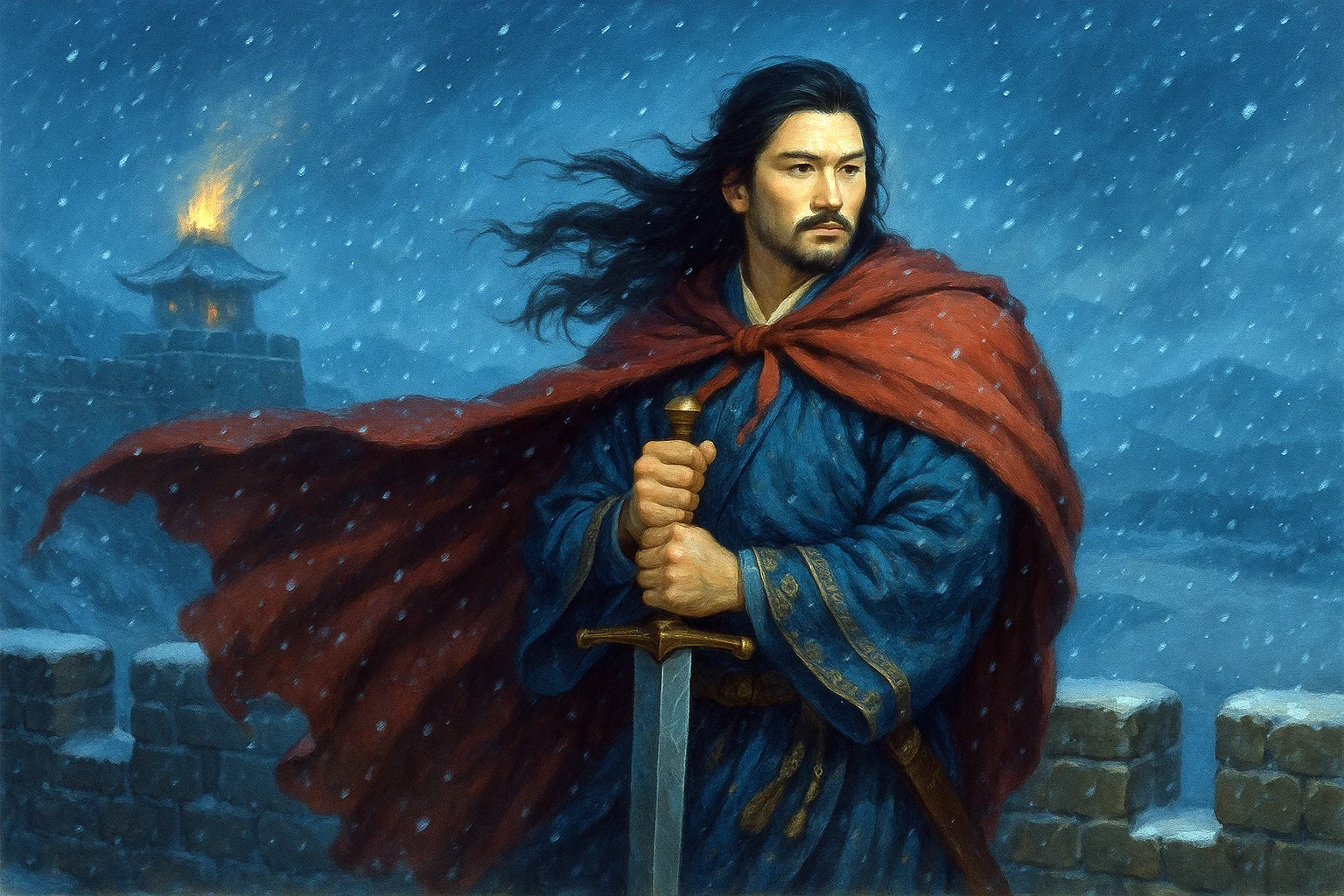
Cen Can(岑参), 715-770 AD, was a native of Jingzhou, Hubei Province. He studied at Mt. Songshan when he was young, and later traveled to Beijing, Luoyang and Shuohe. Cen Shen was famous for his border poems, in which he wrote about the border scenery and the life of generals in a majestic and unrestrained manner, and together with Gao Shi, he was an outstanding representative of the border poetry school of the Sheng Tang Dynasty.






